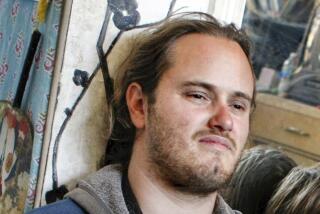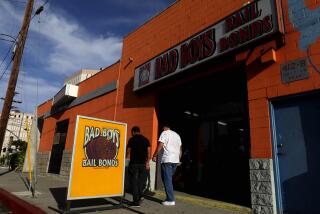Madoff deputy is denied bail
- Share via
NEW YORK — When Frank DiPascali Jr. walked into a federal courthouse Tuesday afternoon, he expected to be able to stroll right back out. Instead, DiPascali, a key witness in the Bernard L. Madoff Ponzi scheme, was led away in handcuffs after a federal judge took the unusual step of rejecting the prosecution’s recommendation that he remain free on $2.5 million in bail pending sentencing.
On Wednesday, while DiPascali, 52, a former Madoff aide, sat in a Manhattan jail, legal experts questioned the effect the judge’s decision would have on potential witnesses as the federal government continues its investigation of the billion-dollar Ponzi scheme and other high-profile cases arising from the financial crisis.
Although the decision does not set a binding precedent, some prominent former federal prosecutors and criminal defense attorneys said it would have a chilling effect on potential witnesses’ willingness to work with authorities.
Cooperating witnesses who plead guilty to white-collar crimes often are allowed to remain free on bail until sentencing. This can help prosecutors logistically, as they do not have to arrange for meetings in jail to go over voluminous documents.
Some legal experts said the consequences would be limited, partly because any ruling in the Madoff case is not easily applicable to other crimes. But almost universally they expressed surprise at U.S. District Judge Richard J. Sullivan’s finding that DiPascali could be a flight risk.
Sullivan, a widely respected former federal prosecutor, left open the possibility that he might free DiPascali, saying he would consider a revised bail agreement.
“The collateral consequence of that denial can create a chilling effect on cooperating witnesses,” said Charles Ross, a white-collar criminal defense attorney who is representing a former employee of Madoff Investment Securities. “Your freedom while providing cooperation is a very, very important consideration to witnesses coming forward.”
DiPascali pleaded guilty to 10 felony counts. He faces a maximum of 125 years in prison but probably will serve less because of his cooperation. In court Tuesday, he spoke, sometimes through tears, of how he and others he did not identify helped Madoff perpetuate the fraud, including creating fake trade records.
DiPascali is only the second insider to acknowledge his role in the Madoff scheme. Though Madoff insisted during his own guilty plea that he acted alone, DiPascali has indicated others were involved, and he will likely be a key witness in future cases against potential accomplices. Madoff is serving 150 years in a North Carolina prison.
More to Read
Sign up for Essential California
The most important California stories and recommendations in your inbox every morning.
You may occasionally receive promotional content from the Los Angeles Times.










